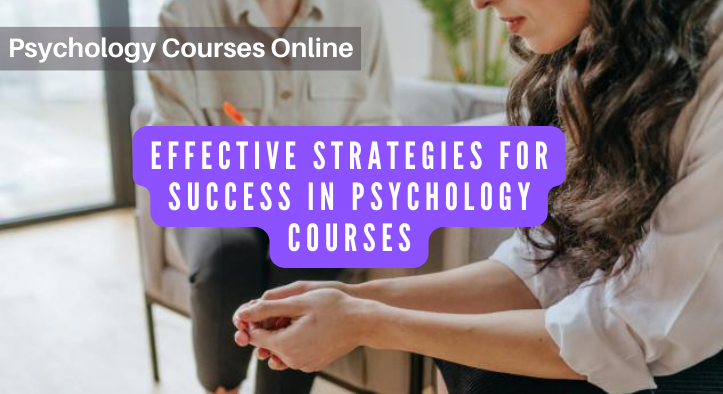Mastering Online Learning: Effective Strategies for Success in Psychology Courses

Time Management, Building a Supportive Network, and Staying Motivated in Virtual Classrooms”
Online learning has become increasingly popular, providing individuals with the opportunity to pursue their education conveniently and flexibly. However, succeeding in online psychology courses requires a unique set of strategies and skills. This article aims to guide students in mastering online learning by exploring effective strategies for success in psychology courses. It emphasizes the importance of time management, building a supportive network, and staying motivated while navigating virtual classrooms.
1. Time Management:
Effective time management is crucial for success in online psychology courses. Without the structure of traditional classroom settings, it’s important to create a schedule and stick to it. Consider the following strategies:
a. Set a Routine: Establish a consistent study routine that aligns with your other commitments. Dedicate specific blocks of time for coursework, assignments, and discussions.
b. Prioritize Tasks: Identify high-priority tasks and assignments, and allocate sufficient time for each. Break larger tasks into smaller, manageable chunks to avoid feeling overwhelmed.
c. Eliminate Distractions: Minimize distractions by creating a dedicated study environment, turning off notifications on your devices, and staying focused on the task at hand.
d. Use Productivity Tools: Utilize productivity tools, such as calendars, to-do lists, and task management apps, to organize your coursework, deadlines, and study materials.
e. Practice Self-Discipline: Develop self-discipline and hold yourself accountable for completing tasks on time. Avoid procrastination by setting deadlines for yourself and rewarding your progress.
2. Building a Supportive Network:
Though online learning may feel isolating, it’s essential to build a supportive network to enhance your learning experience. Consider the following strategies:
a. Engage in Discussion Forums: Actively participate in online discussion forums to connect with classmates, ask questions, share insights, and learn from different perspectives.
b. Collaborate on Group Projects: Form study groups or join collaborative projects to foster peer-to-peer learning and establish meaningful connections with fellow students.
c. Seek Virtual Office Hours: Take advantage of virtual office hours offered by instructors to seek clarification, guidance, or additional resources.
d. Connect through Social Media: Join online communities, social media groups, or forums related to psychology to connect with like-minded individuals, share resources, and engage in discussions beyond the virtual classroom.
e. Network with Professionals: Utilize online platforms or professional networking websites to connect with professionals in the field of psychology. Seek mentorship or informational interviews to gain valuable insights and expand your network.
3. Staying Motivated:
Maintaining motivation throughout your online psychology courses can be challenging. However, with the right strategies, you can stay motivated and focused. Consider the following tips:
a. Set Goals: Establish clear goals for each course or module. Break them down into smaller milestones to track your progress and celebrate achievements along the way.
b. Find Meaning and Purpose: Reflect on the significance of studying psychology and how it aligns with your personal or career aspirations. Remind yourself of the impact your education can have on your future.
c. Create a Supportive Environment: Surround yourself with motivational resources, such as inspiring quotes, articles, or podcasts related to psychology. Designate a study space that is conducive to concentration and productivity.
d. Take Breaks and Practice Self-Care: Schedule regular breaks during study sessions to prevent burnout. Engage in activities that recharge you, such as exercise, hobbies, or spending time with loved ones.
e. Celebrate Progress: Acknowledge and celebrate your accomplishments along the way. Reward yourself for completing assignments, reaching milestones, or mastering challenging concepts.
Mastering online learning in psychology courses requires effective strategies to manage time, build a supportive network, and stay motivated. By implementing these strategies, students can navigate virtual classrooms successfully and enhance their overall learning experience. With disciplined time management, active engagement with peers and instructors, and a strong sense of motivation, students can thrive in their online psychology courses and achieve their educational goals.
